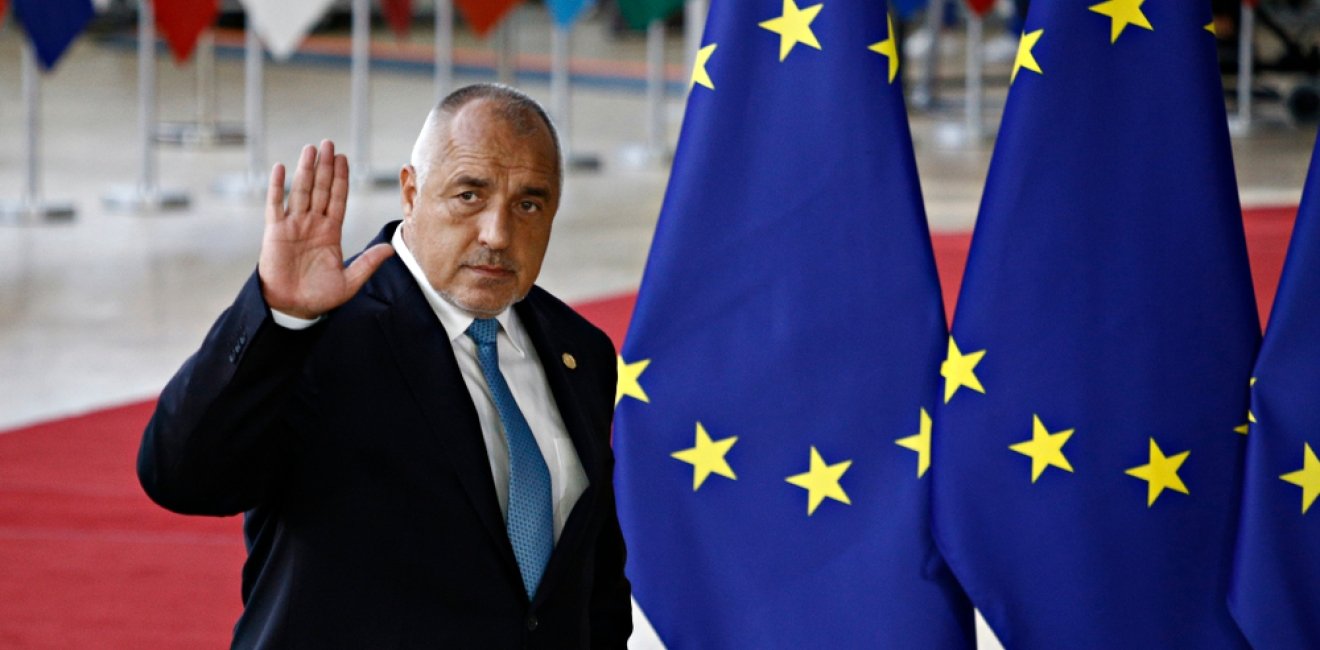While a major part of the world has been holding their breath in expectation for the US presidential election, one country—an EU and NATO member—has been spiraling deeper into a political crisis with seemingly no end in sight. On October 27, Bulgaria held its 7th parliamentary election since April 2021, and a highly likely outcome is for the country to head to its 8th election in just four years in spring 2025. This is a very real possibility, as the most recent election did not result in any significant reshuffling of seats in parliament and could in general be considered a close repeat of the previous few snap elections. The political crisis is now fraught with questions of voter fraud, election integrity, and corruption.
Background
From 2017 to 2021, Bulgaria was ruled by center-right, pro-EU party GERB (Citizens for European Development of Bulgaria) together with right-leaning coalition partners—although GERB has been the central player in the Bulgarian political spotlight since 2009. In 2020, a raid on the Bulgarian Presidency building was followed by mass protests against corruption and abuse of power. GERB, led by party leader Boyko Borissov, won the election in April 2021, but failed to form a coalition government as all other parties refused to join him. The result: a snap election in July the same year. This marked the beginning of what would become a pattern: various parties and formations winning consecutive snap elections but failing to form long-term, stable governments. In November 2021, the newly formed anti-establishment We Continue the Change party (PP) ran an anti-corruption campaign and won, promising to shake up the system. After the election, they entered an anti-GERB coalition with leftist Bulgarian Socialist Party (BSP, a legacy of the pre-transition Bulgarian Communist Party), liberal Democratic Bulgaria (DB) and right-leaning populist party There is Such a People (ITN). However, after disagreements between the coalition partners, the government collapsed in June 2022 after the first successful vote of no confidence in modern Bulgarian history.
Following another unsuccessful election in October 2022, elections in April 2023 saw GERB win again. This time, it managed to form a rotational government agreement with its staunch opponents PP-DB. Part of the agreement was a rotation of the prime ministership between the two parties, with a prime minister from PP-DB leading the country for 9 months, followed by another 9-month period led by a prime minister proposed by GERB. At the end of the first 9-month period, however, this highly unusual agreement collapsed, and Bulgarians headed to the polls once again for yet another snap election in June 2024. After this sixth election failed to result in the formation of a government, the seventh consecutive election was held on October 27, 2024.
October 2024 Election Results
The latest election results can be summarized in two main points. First, there wasn’t much change in the distribution of seats. GERB again finished first with 26.4% of the votes, followed by PP-DB and the ultranationalist Revival party. Second, the election saw increased attention to voter fraud and the purchasing of votes, with the Russian interference recently uncovered in Moldova posing questions about the extent to which similar activities are taking place in Bulgaria. Another significant development was the split of the Turkish-interest-centered Movement for Rights and Freedoms party (DPS), which has maintained a stable and powerful presence on the Bulgarian political scene since the 1990s by relying on the steady votes of Turkish and Roma ethnic minorities in Bulgaria and abroad. The split reflects disagreements between symbolic party leader Ahmed Dogan, who has been involved with the party since its formation, and newer leader Delyan Peevski, who has been sanctioned by the US government for corruption and abuse of power since 2021. Both factions found their way into Parliament following the most recent elections, essentially splitting the DPS vote.
The latest election results can be summarized in two main points. First, there wasn’t much change in the distribution of seats. GERB again finished first with 26.4% of the votes, followed by PP-DB and the ultranationalist Revival party. Second, the election saw increased attention to voter fraud and the purchasing of votes, with the Russian interference recently uncovered in Moldova posing questions about the extent to which similar activities are taking place in Bulgaria.
Worrying Trends
While these results do not represent any significant shifts from the status quo established in the more recent snap elections, they do represent a continuation of some increasingly worrying trends. Bulgaria is steadily into its 4th year of political instability and crisis, with little hope for prompt resolution. In June, election turnout reached a record-low 34.4% (with a slight increase in October).
This shows a continuous erosion of Bulgarians’ trust in political institutions, allowing populist and radical right-wing parties to gain power. Bulgarians are losing trust in their national government and institutions, especially the judicial system, ranking among the last in the world in Gallup’s National Institutions Index. Meanwhile, trust in domestic elections is the lowest in the world at a shocking 10%.
Of the Bulgarians that continue to cast their votes, many are turning toward ultranationalist and far-right parties, whose vote shares have steadily risen and now for the first time reached over 20% of the combined vote. This complicates coalition-making even further and jeopardizes the legitimacy of the EU and NATO in Bulgaria, as these parties are staunchly opposed to both. Bulgaria also has one of the lowest popular approval ratings of the EU, as it fell below the EU average in 2022 joining Hungary, Slovakia, and Greece at the bottom. Still, trust in the EU is significantly higher than the trust in the country’s domestic institutions. In a time when Bulgaria is finally due to become a full member of the Schengen area, these developments are especially awkward for both the EU and Bulgaria itself.
Overall, this political crisis is making Bulgaria even more vulnerable to Russian meddling, especially in the increasingly volatile times of systemic changes and geopolitical shifts on a regional and global scale.
Bulgarian society is starting to feel the effects of prolonged political gridlock as the government struggles to work effectively. This is increasingly affecting its citizens. Many of them place the blame for their misfortunes on the EU and the West, and some even express nostalgic sentiments toward Russia.
Another worrisome development of the past four years is that the leader of one of the political parties in Parliament, who is a possible candidate for a coalition government, is sanctioned under the US Global Magnitsky Human Rights Accountability Act. In 2021, the US Department of the Treasury sanctioned Delyan Peevski and his networks by removing his access to the US financial system for his “roles in corruption in Bulgaria”. This came as a complementary action after the US State Department sanctioned Peevski for his “involvement in significant corruption". The US Department of the Treasury accuses Peevski of influence peddling, using bribes for personal protection, and exerting control over various institutions and sectors in Bulgaria. He is also accused of election meddling and abusing his media power to provide politicians with positive news coverage in exchange for protection from criminal investigations, running bribery schemes for residency documents for foreign persons, public funds embezzlement, and abuse of power for personal gains.
One of the main tasks that Bulgaria had to complete in order to get rid of the Cooperation and Verification Mechanism (CVM) imposed on Bulgaria and Romania as a condition to their accession to the EU in 2007 was to actively fight against corruption. The two countries were required to make significant progress in addressing corruption, organized crime, and pursuing judicial reform. While the CVM was officially closed in 2023, an oligarch sanctioned by the US Department of the Treasury for corruption maintains a prime position in the Bulgarian political landscape.
What is the Way Out?
In their recent history, Bulgarians have tended to be drawn to popular, savior-like figures to rally around in times of crisis or change. This happened in 2001, when the former heir to the Bulgarian throne—Simeon Sakskoburggotski and his newly-formed NDSV party—ran for office in the parliamentary elections and won by a landslide. This was also visible in the election of GERB’s Boyko Borissov in 2009, who gained popularity while being mayor of Sofia, and later with the emergence of the PP party in fall 2021 with their promise to eliminate corruption. Music star and former late-night show host Slavi Trifonov and his populist party ITN managed to win the summer 2021 snap election after gaining traction following the anti-corruption protests in 2020 and the elections in April 2021. Despite the controversy surrounding his position on the war in Ukraine, incumbent President Rumen Radev has maintained a strong role during the political crisis since his reelection in 2021, with speculation that he might form a new political project and seek a role in Parliament after his tenure as President runs out in early 2027. However, this is still two years away; for the immediate future, few alternative leaders are likely to present themselves.
Bulgarian society is starting to feel the effects of prolonged political gridlock as the government struggles to work effectively. This is increasingly affecting its citizens.
Overall, this political crisis is making Bulgaria even more vulnerable to Russian meddling, especially in the increasingly volatile times of systemic changes and geopolitical shifts on a regional and global scale. The recent uncovering of large-scale vote buying in Moldova’s EU referendum and widespread interference in the Romanian presidential elections in favor of the far-right, anti-EU, anti-NATO, and pro-Russia leaning candidate Călin Georgescu (with the latter election being annulled as a result) further underscore the critical situation in the region. With many of these activities suspected of being carried by companies registered in Bulgaria, it is likely that similar activities have been taking place inside Bulgaria as well—they just have not been uncovered yet.
Bulgaria is a relatively young democracy, and the prompt successful resolution of this political crisis is important to avoid long-term negative consequences, including a firmer political grasp of the mafia and sinking deeper into the corruption whirlpool. The bottom line is that the EU cannot afford for this political crisis to continue and deepen much longer, as it exposes itself to malign influences and vulnerability at its south-eastern external border.
Authors

Postdoctoral Fellow, Johns Hopkins School of Advanced International Studies


Global Europe Program
The Global Europe Program is focused on Europe’s capabilities, and how it engages on critical global issues. We investigate European approaches to critical global issues. We examine Europe’s relations with Russia and Eurasia, China and the Indo-Pacific, the Middle East and Africa. Our initiatives include “Ukraine in Europe”—an examination of what it will take to make Ukraine’s European future a reality. But we also examine the role of NATO, the European Union and the OSCE, Europe’s energy security, transatlantic trade disputes, and challenges to democracy. The Global Europe Program’s staff, scholars-in-residence, and Global Fellows participate in seminars, policy study groups, and international conferences to provide analytical recommendations to policy makers and the media. Read more

Explore More
Browse Insights & Analysis
Greenland’s New Governing Coalition Signals Consensus

Myanmar’s Junta and the 2026 Elections: A Fig Leaf for Legitimacy?


